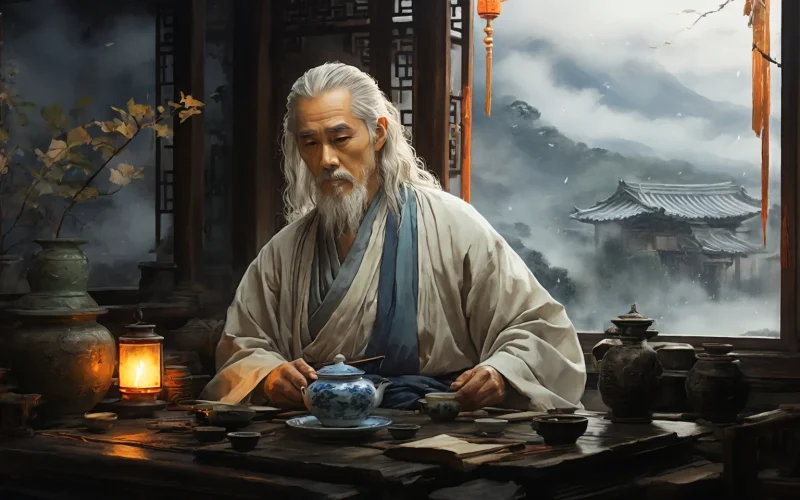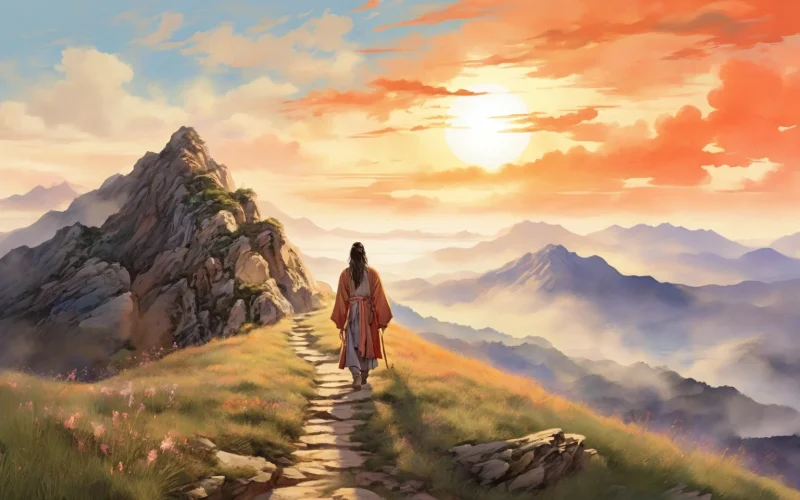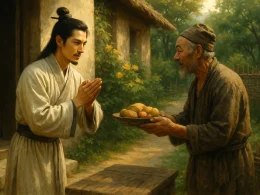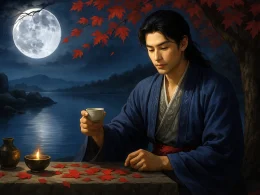The way is broad like the blue sky,
But no way out before my eye.
I am ashamed to follow those who have no guts,
Gambling on fighting cocks and dogs for pears and nuts.
Feng would go homeward way, having no fish to eat;
Zhou did not think to bow to noblemen was to meet.
General Han was mocked in the market place;
The brilliant scholar, Jia was banished in disgrace.
Have you not heard of King of Yan in days gone by,
Who venerated talents and built Terrace high
On which he offered gold to gifted men
And stooped low and swept the floor to welcome them?
Grateful, Ju Xin and Yue Yi came then
And served him heart and soul, both full of stratagem.
The king's bones were now buried, who would sweep the foot
And the Gold Terrace any more?
Hard is the way. Go back without delay!
Original Poem
「行路难 · 其二」
李白
大道如青天,我独不得出。
羞逐长安社中儿,赤鸡白雉赌梨栗。
弹剑作歌奏苦声,曳裾王门不称情。
淮阴市井笑韩信,汉朝公卿忌贾生。
君不见昔时燕家重郭隗,拥篲折节无嫌猜。
剧辛乐毅感恩分,输肝剖胆效英才。
昭王白骨萦蔓草,谁人更扫黄金台?
行路难,归去来!
Interpretation
This poem is the second in a three-poem series composed after Li Bai suffered political setbacks in Chang'an, where he fell victim to slanderous accusations. In 742 CE, Emperor Xuanzong summoned Li Bai to the capital to serve as a Hanlin academician. However, instead of gaining recognition, he faced exclusion by powerful ministers. Two years later, he was "granted gold and sent away," forced to leave Chang'an. This poem expresses the poet's anguish over his thwarted official career and the pain of unrecognized talent.
First Couplet: "大道如青天,我独不得出。"
Dàdào rú qīngtiān, wǒ dú bùdé chū.
The great road stretches wide as blue sky; Yet I alone find no path to fly.
The poet uses the "blue sky" to metaphorize the breadth of official career paths, then immediately contrasts it with his inability to advance, creating strong opposition that highlights his inner indignation and frustration. This line establishes the poem's tragic tone with grand vision and profound meaning. This lament of "the world is so vast, yet there's no place for me" represents a cross-cultural dilemma about individual exclusion in a broad world, easily resonating universally.
Second Couplet: "羞逐长安社中儿,赤鸡白雉赌梨栗。"
Xiū zhú Cháng'ān shè zhōng ér, chì jī bái zhì dǔ lí lì.
Ashamed to chase Chang'an's youthful peers, Betting pheasants for pears—how low appears!
Li Bai despises the degenerate lives of Chang'an's aristocratic youth obsessed with cockfighting and gambling. This expresses not only his refusal to compromise his integrity but also his deeper break with worldly value systems. For him, spiritual independence and ideal realization far outweigh gaining petty practical benefits.
Third Couplet: "弹剑作歌奏苦声,曳裾王门不称情。"
Tán jiàn zuò gē zòu kǔ shēng, yè jū wángmén bùchēng qíng.
Strumming sword, I sing bitter songs; Serving nobles, where my heart wrongs.
Using the allusion to Feng Xuan strumming his sword, the poet precisely depicts his predicament as an ill-treated guest under powerful patrons. "Serving nobles" vividly portrays the discomfort and humiliation felt by a dignified scholar forced to submit to others.
Fourth Couplet: "淮阴市井笑韩信,汉朝公卿忌贾生。"
Huáiyīn shìjǐng xiào Hán Xìn, Hàncháo gōngqīng jì Jiǎ Shēng.
Huaiyin's streets laughed at Han Xin; Han court ministers envied Jia's sheen.
Li Bai alludes to historical figures Han Xin and Jia Yi to reflect his own situation. This shows that great talents, when unrecognized, face not only bullying by commoners but also jealousy and suppression by colleagues due to their brilliance—a double bind of internal and external difficulties.
Fifth Couplet: "君不见昔时燕家重郭隗,拥篲折节无嫌猜。"
Jūn bùjiàn xīshí Yān jiā zhòng Guō Kuí, yōng huì zhéjié wú xián cāi.
Recall how Yan revered Guo Kui; Broom in hand, no distrust to see.
The poet shifts to recall the golden age of King Zhao of Yan valuing talents. "Broom in hand" depicts Li Bai's ideal ruler-subject relationship—absolute respect and trust.
Sixth Couplet: "剧辛乐毅感恩分,输肝剖胆效英才。"
Jù Xīn Yuè Yì gǎn'ēn fēn, shū gān pōu dǎn xiào yīngcái.
Ju Xin, Yue Yi, grateful and true; Offered their talents, service due.
The reciprocal actions of Ju Xin and Yue Yi form a virtuous cycle of "wise rulers recognizing talents—talents serving rulers," reflecting Li Bai's deepest yearning to find a worthy lord and devote his talents unreservedly.
Seventh Couplet: "昭王白骨萦蔓草,谁人更扫黄金台?"
Zhāo wáng báigǔ yíng màn cǎo, shéi rén gèng sǎo huángjīntái?
King Zhao's bones lie in weed; Who sweeps Gold Tower for talent's need?
This line marks the poem's emotional turning point, shifting from longing for ancient glory to cold reality. The Gold Tower, symbol of recruiting talents, now stands neglected—a direct, poignant critique of contemporary rulers' indifference to genuine talent.
Eighth Couplet: "行路难,归去来!"
Xínglù nán, guīqù lái!
Hard the road, hard the way! Home I'll go, no more to stay!
This sigh is both an angry protest and a desperate declaration. "Home I'll go" alludes to Tao Yuanming, signaling complete break with officialdom. Yet this retreat isn't willing reclusion but an active withdrawal by a proud soul bruised by reality, filled with profound disappointment and anger.
Holistic Appreciation
The poem tightly revolves around the theme "hard the road," using dense historical allusions to create contrasts between Han Xin/Jia Yi's plight and King Zhao of Yan/Guo Kui's ideal stories, constructing a grand historical framework. Li Bai elevates his personal grievances into a profound lament on talents' universal fate throughout history. The poem combines fierce reality criticism with nostalgic longing for an ideal world, creating powerful emotional collisions between indignation and aspiration, despair and resistance.
Artistic Merits
- Strong Contrasts: The opening contrast between "great road" and "no path," along with historical versus contemporary comparisons, intensifies the poet's resentment.
- Precise Allusions: The dense yet accurate historical references serve as emotional vehicles and philosophical arguments, greatly deepening the poem's intellectual depth.
- Emotional Volatility: From initial indignation, through nostalgic longing, to final criticism and resolve, the emotional turbulence creates powerful impact, concluding with a resonant sigh.
Insights
This poem transcends individual lament to mirror ancient political ecosystems. It reveals how societies lacking fair talent selection mechanisms and respect for ability cause massive brain drain. Li Bai's resolute "home I'll go" represents clear-eyed resistance. It reminds us that individual value shouldn't be solely defined by official success—maintaining spiritual independence and personal integrity amid ideal-reality conflict is itself a great achievement.
Poem translator
Xu Yuanchong(许渊冲)
About the poet

Li Bai (李白), 701 - 762 A.D., whose ancestral home was in Gansu, was preceded by Li Guang, a general of the Han Dynasty. Tang poetry is one of the brightest constellations in the history of Chinese literature, and one of the brightest stars is Li Bai.












